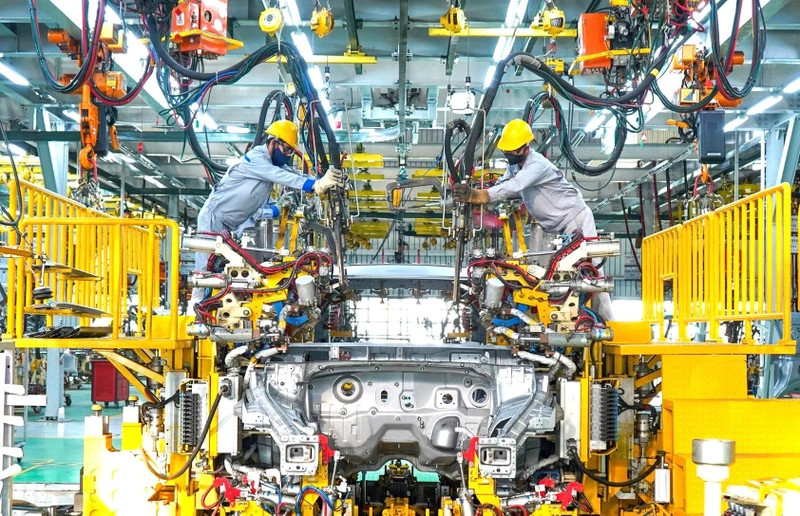Outstanding solutions will be soon promulgated
In recent times, despite continuing to develop in both quality and quantity, the private economy still faces many barriers, affecting its role as a driving force of the economy, as well as its ability to contribute to the country's development. Citing figures demonstrating the importance of Vietnam's private economic sector when it contributes more than 50% of GDP, about 30% of state budget revenue, and attracts about 85% of the workforce...
Associate Professor, Dr. Pham Thi Hoang Anh - Deputy Director in charge of the Board of Directors of the Banking Academy, pointed out the fact that promoting the role and ability to contribute of this sector to the development of our country's economy is still limited due to many obstacles.
First of all, the private economic sector is both modest in scale and competitiveness, and lacks connectivity and long-term vision. There have even been cases where, because of chasing immediate profits, it has caused negative impacts on the business environment and society.
Explaining further, Hoang Anh pointed out that the biggest limitation that makes it “difficult for private enterprises to grow” is the obstacle of increasing capital scale as well as opportunities to access bank credit sources. Specifically, by 2024, outstanding credit to GDP is about 136%, however, the capital ratio for this business sector is not really clear.
Discussing this issue, at the working session of General Secretary To Lam with the Party Central Committee’s Commission for Policies and Strategies on the topic of private economic development in the coming time, Tran Luu Quang, Secretary of the PCC, Head of the PCC’s Commission for Policies and Strategies, proposed that there should be outstanding and revolutionary solutions in creating a sustainable and long-term development environment for the country’s private economy.
Directing the orientation and solutions to remove bottlenecks in mechanisms for the private economy, chairing the working session, General Secretary To Lam emphasized that it is necessary to ensure equality, fairness and allow private enterprises to access production capital sources no less than state-owned enterprises and enterprises with foreign direct investment (FDI), creating conditions for private enterprises to participate in key national projects.
Notably, the General Secretary affirmed that the Politburo will soon issue a separate resolution to create a breakthrough for private economic development, because this is a task that cannot be delayed.
Enterprises also need a new spirit and new awareness
In reality, while state-owned enterprises still receive protection from the State, FDI enterprises enjoy many preferential policies... the private sector has not received due attention, facing difficulties in accessing capital, land, tax policies or administrative procedures.
The key point to create a breakthrough is to quickly remove barriers and obstacles to business development, and have comprehensive and flexible support policies for the private economic sector.
With this point of view, Deputy General Secretary, Head of the Legal Department of the Vietnam Federation of Commerce and Industry Dau Anh Tuan once pointed out that there are things that can be done immediately without much money, such as reforming the administrative system and economic institutions. This is the factor that needs to be prioritised so that the private economy can affirm its position and join hands to serve the country.
From the business perspective, Nguyen Hoang - Chairman of the Hanoi Supporting Industry Enterprises Association, and Vice Chairman of the Vietnam Supporting Industry Association, shared that the private business community is looking forward to the new resolution that will correctly define the role and position of the private economic sector as a basis for institutional reform to be implemented strongly, extensively and promptly.
According to Hoang, the current business environment, although having many reforms, is not favourable because the compliance costs are too high, becoming a burden for businesses, especially for supporting industry enterprises when they have to pursue very high standards of foreign partners.
Or in the field of transport infrastructure, the brand of Vietnam Infrastructure Development and Finance Investment Corporation (VIDIFI) is associated with the 5B Expressway (Hanoi-Hai Phong) - a project highly appreciated for its quality as well as economic efficiency. In 2024, VIDIFI won the bid for 54 km of the North-South expressway project, eastern branch (section from Km351+000 to Km405+000).
With the expectation that the State will place its trust in domestic private contractors when implementing investment in key national projects, VIDIFI General Director Tran Anh Tu shared, we hope and are confident that we will demonstrate our responsibility to the country and society through the quality of the works. Of course, to achieve this, there must be preferential mechanisms from the State on accessing medium and long-term capital flows or advantages of domestic contractors...
From another perspective, according to Le Hoang Minh - General Director of Tien Thanh Group Joint Stock Company, in addition to breakthrough policies, there must be proactive and effective exploitation of the strengths of each enterprise in each specific field. In the new context, each enterprise also needs to have a new spirit, new awareness, dare to commit, increase solidarity to promote national aspirations for a prosperous future.
Once businesses are trusted and given important responsibilities in the development of the country, and are allowed to develop together in a more equal playing field between economic sectors, there will certainly be more and more strong private businesses, capable of developing their brands in the global market.
















